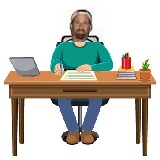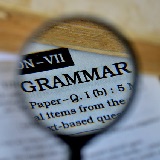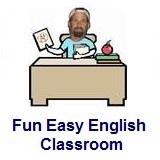|
|
| |
|
|
| |
|
|
| Fun Easy English Classroom April 4 |
|
| |
Classroom
Today
Learn about
English
personal objective
pronouns |
|

Today in the Fun Easy English classroom you are going to learn about
personal objective pronouns an important part of English
grammar. |
 Hey
if you cannot understand something on this page, Hey
if you cannot understand something on this page,
then use the Fun Easy English
dictionary
(opens in a new window) |
|
|
|
 Grammar:
Personal
Objective Pronouns Grammar:
Personal
Objective Pronouns
Definition of a
personal objective pronoun. |
|
|
- I went to the supermarket with her.
- She went to the supermarket with me.
- The following words are personal objective pronouns
- me, you, him, her, it, us, them
|
|
 From
YOUR Teacher: Personal
Objective Pronouns From
YOUR Teacher: Personal
Objective Pronouns
Personal objective pronouns are words which replace a
noun affected by an action in a sentence.
John went to the supermarket with
Jane, becomes, John went to the supermarket with
her.
Her replaces
Jane. |
|
|
|
|
|
Additional Lessons |
 About These
Lessons About These
Lessons
The following classroom lessons are great for students
who want additional conversation, listening, and reading
practice. |
-
Conversation Lesson -
Beginner Level. Dialogs for everyday use.
Short situational dialogs for students of English as
a Foreign (EFL) or Second (ESL) Language with a
written conversation and a conversation notes
section.
|
 Conversation Lesson
12 - Games Conversation Lesson
12 - Games
(Beginner -
Conversation, Reading)
Dialogs for everyday use. Short situational dialogs for
students of English as a Foreign (EFL) or Second (ESL)
Language. |
Games
George: Say, Joe, do you play bridge?
Joe: No, I don’t play any card games. But
I know how to play
chess. How about you, George?
George: Well, I happen to be
one of the best chess
players around.
Joe: 0.K. Let’s play, then. We’ll see who’s the best. |
|
Conversation Notes |
- Say
- An interjection, used very informally as an attention
getter.
- I don’t play any card games
- Notice there is a strong stress on card. It is normal
for this word to be stressed, as it is the first element of the compound
noun CARD games. The unusually strong stress here implies that, although the
speaker doesn’t play card games, he does play other kinds of games (as, for
instance, chess).
- I know how to play chess
- The idiom know how to, meaning to be capable of, to have
the skill to do something, is widely used. For example: Do you know how to
swim? He knows how to drive a car. I don’t know how to write.
- How about you, George
- In this case means Do you play chess, George?
- one of the best chess players
around
- Meaning is one of the best chess players in this
vicinity. Chess players is a compound noun, and therefore has the principal
stress on chess.
|
|
Source: U.S. State Department |
|
Additional Conversation |
 Conversation Conversation
This is a collection of 36 situational conversations
which focus on spoken American English in a relatively
natural way....these
lessons are for intermediate students. |
 Conversation Conversation
This is a collection of 30 situational conversations. Each conversation is
accompanied by language notes....these
lessons are for advanced students. |
 Conversation Conversation
English conversation lessons. 52
lessons covering pronunciation, speaking,
writing, and grammar topics....these
lessons are for beginning students. |
 Conversation Conversation
English conversation lessons. 30
lessons focusing mostly on communication and
grammar topics....these
lessons are for intermediate students. |
|
|
|
|
|
|
|
 Hey Students, Hey Students,
Use this dictionary and reference to look up any words you do not
understand in Fun Easy English.
Note: search opens in a new tab. |
|
|
|
|
|
Search Fun Easy English |
|
|
|
|
|
|
|
|
|
|
|
|
|
|
|
About
Contact
Copyright
Resources
Site Map |